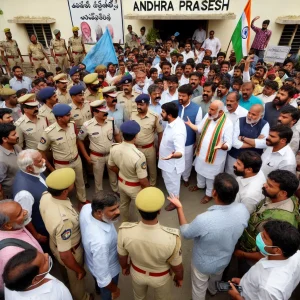
The privatization of Visakhapatnam Steel Plant (RINL) has become a saga of contradictions, uncertainty, and political doublespeak. The BJP-led central government, which once pushed aggressively for divestment, now appears hesitant, leaving the fate of thousands of employees and Andhra Pradesh’s industrial future hanging in the balance. The TDP, now an ally of the BJP in the NDA government, has remained largely non-committal, despite its campaign rhetoric of safeguarding the interests of Andhra Pradesh. The question remains: Is this another classic case of BJP’s see-saw approach to privatization?
Government’s Ever-Shifting Stance on RINL
In 2021, the Modi government made its intentions clear—100% strategic disinvestment of RINL. Justifications ranged from financial losses to the need for private investment in a cash-strapped entity. However, public outcry, trade union protests, and political backlash forced the government to go slow. Fast forward to 2024, the steel plant is still in limbo, with neither clarity on its privatization nor any concrete revival plan from the Centre.
This pattern of announcing privatization, backtracking under pressure, and maintaining ambiguity has been a defining trait of the BJP’s economic policy. Several PSUs have undergone a similar fate:
- BPCL (Bharat Petroleum): Initially slated for sale in 2019, the process dragged on until it was put on hold indefinitely due to lack of buyer interest.
- Air India: After an unsuccessful privatization attempt in 2018, the sale was finally completed in 2021, but only after years of uncertainty.
- Container Corporation of India (CONCOR): Announced for privatization but stalled due to land lease complications, leaving investors in confusion.
- Ahmedabad, Lucknow, and Mangaluru Airports: Given to Adani after an initially uncertain bidding process, raising concerns about crony capitalism.
TDP’s Deafening Silence on the Issue
With the TDP back in power in Andhra Pradesh and part of the NDA alliance, Chief Minister Chandrababu Naidu finds himself in a tricky position. While his party has historically opposed the privatization of RINL, his current alignment with the BJP means he must tread carefully. However, silence is not an option. The people of Visakhapatnam, trade unions, and opposition parties have been demanding clear answers—Will the TDP pressure the BJP to halt privatization, or will it succumb to the Centre’s economic agenda?
The Human Cost of Political Indecision
Beyond corporate strategies and political calculations, thousands of RINL employees and their families remain in a state of uncertainty. The plant is a lifeline for Visakhapatnam’s economy, and its privatization could have far-reaching consequences for the working class. The BJP’s reluctance to provide a clear roadmap only fuels more frustration.
Conclusion: Time for Answers, Not Excuses
The BJP’s history with PSU privatization shows a pattern—big announcements, prolonged uncertainty, and selective execution. RINL seems to be caught in the same loop. Meanwhile, the TDP’s credibility is at stake. Will Naidu take a stand, or will he continue to sit on the fence? Andhra Pradesh deserves answers, and the people of Visakhapatnam won’t accept silence as an excuse.




